Five Things I'm Reading
a bracing dose of harsh reality plus a side of genre-fiction comfort food (plus a poll at the end about what yellow to paint my living room ceiling!)
On this bright light day of the Solstice (actually a little too light and too bright for this winter creature, especially during a humid heat wave in Philly), I’m canceling all outdoor plans and enjoying the sunlight only as it pours through my living room window.
Life is a bit hectic right now, and this is probably as close as I’m going to get to actually observing the solstice: hunkering down in my cozy spot with a stack of books I think you might be interested in.
It probably will not come as a huge surprise that, like Jesse, I tend to “graze” books, almost always several at a time. Right now I probably have between six and ten books going, but I will limit myself to five in this post, some of which I’m still grazing, some of which I have actually finished all the way through (much more likely with a novel than with nonfiction).
Traditionally, a “book review” is supposed to note both strengths and weaknesses of a book, but I’m only going to share books that I can wholeheartedly endorse (even if I don’t think they are perfect), and so I am only going to tell you what I love about them.
In no particular order:
Unlearning Shame: How We Can Reject Self-Blame Culture and Reclaim Our Power by Dr. Devon Price.
It’s no secret that I’m a big fan of Devon’s work, including his eponymous substack newsletter, and this, his third book, does not disappoint. I’ve been interested in shame for years, and especially in the ways that shame intersects with neurodivergence to create dysfunction in our lives. But Devon’s is a far wider and deeper treatment of the function of shame in our society, especially the ways it is deployed by neoliberal institutions to keep us fragmented and trapped in individualistic efforts to have agency and making a difference, when in fact our only real power is in relationship and collective action. Devon looks at three different levels of what he calls “Systemic Shame”—personal shame, interpersonal shame, and global shame. He recounts the history and intrinsic values of Systemic Shame, as well as the social and psychological reasons why shame is never helpful or useful in motivating action or creating change.
All of that is great, but the real genius of this book, in my opinion, is in the second half, where Devon proposes an approach to unlearning and rejecting Systemic Shame which he calls “Expansive Recognition.” Devon explains, “If you’ve ever revealed a closely held, shameful secret to a stranger only to discover they have been through the exact same experience as you, you’re familiar with how expansive recognition feels” (129). This section in my copy of the book is all marked up with stars and exclamation points and marginal notes declaring things like “This is Peer Support!!” There is more to expansive recognition than just peer support, of course, which largely follows themes of the importance of relationship and community-building, which are the red thread stitched through all of Devon’s work. I love, as always, how kind and generous Devon is with his readers, and how practical and realistic his suggestions are for unlearning shame and reclaiming our power.
The Trading Game: a Confession by Gary Stevenson
I discovered Gary Stevenson when he was interviewed by several leftist YouTubers/podcasters in the UK, including Owen Jones and Novara Media, and then I followed him to his own YouTube channel, Gary’s Economics. Gary Stevenson was a working class kid who grew up in poverty on the outskirts of London. He was really really good at math (or “maths” as they say in the UK), and ended up going to the prestigious London School of Economics, and then winning a card game that scored him a place as the youngest, and soon the most successful, trader at Citibank. He became phenomenally wealthy, basically from betting, correctly, that the economy was fucked and would continue to get worse year after year. His financial success rose in direct inverse relationship to his declining mental health, and eventually he had a breakdown and quit. He has since become an evangelist for reversing the dramatic redistribution of wealth from the middle class to the ultra-wealthy. In his YouTube videos he explains clearly the mechanisms creating this wealth transfer, offers suggestions for how to reverse it, and warns of the dire consequences of failing to do so. I find him enormously charming and while I’m loath to diagnose anyone, he is certainly very autistically-coded! The Trading Game is less political analysis than it is a page-turner thriller/memoir full of great characters and excellent story-telling of his rise and fall as the most successful trader of his generation at Citibank. If you decide to read this memoir, I suggest watching at least a few videos first, so you can really get a sense of his voice.
Vulture Capitalism: Corporate Crimes, Backdoor Bailouts, and the Death of Freedom, by Grace Blakeley
Grace Blakeley is another journalist/economist from the UK who I discovered through her interviews with Owen Jones and Novara Media. She is a Marxist who manages to very clearly and articulately demystify a Marxist analysis for those of us who forgot to read him in college, and therefore sometimes feel ill-equipped and inarticulate to critique capitalism with the big kids. Her interviews on YouTube will give you the gist of her argument, which is that, well, capitalism sucks—but also, specifically how and why. One interviewer asks her, “So, what exactly is Vulture Capitalism?” And she answers, “Oh, that’s just plain old capitalism—we just needed a catchy title for the book.” If you have a sort of amorphous understanding of what is so terrible about capitalism, but wish you could call bullshit with more confidence and clarity when it comes to right-wing and libertarian talking points about so-called “free markets,” the virtues of “competition,” and just the concept of “freedom” generally—reading this book will help. In particular, she calls out the toxic individualism and anti-collectivism that is at the heart of the neoliberal project. In this way, her critique meshes very well with Devon Price’s analysis in Unlearning Shame. I found the many examples and historical analysis Blakeley offers pretty depressing, but the part of the book I have yet to read (and look forward to reading) is where she offers various hopeful projects and movements that counter these trends.
Field of Blood + The Dead Hour + Slip of the Knife (the Paddy Meehan series) by Denise Mina
As regular readers will know, the genre of UK mysteries is a life-long special interest of mine—like, serious comfort food—but I am trying to find ways, when I can, to indulge it (and to write it) in ways that don’t depend so much on copaganda formulas of the traditional police procedural. This quest is made more difficult by the fact that I’m not a huge fan of super-cozy mysteries—you know, where the little old lady in the knitting shop is constantly stumbling upon dead bodies and then outwitting the police to find their killers? And I’m equally not a fan of the hard-boiled private detective, nor of gritty underworld criminal-as-protagonist. The whole point for me is escape. Comfort food.
Happily, I am discovering that the journalist-as-protagonist is a device I am finding quite satisfying, and I just stumbled on this series by Denise Mina, whom I had never heard of, about a young newspaper reporter named Paddy Meehan, set in Glasgow in the early 80’s. As it turns out, this was right around the time Joel was getting his start as a newspaper guy, though in the vastly different setting of small town middle America. Still, it was fun to imagine him in the thick of this Glasgow newsroom in the salad days of newspapers. It’s also my high school years, which almost coincides with the age of the protagonist Paddy Meehan, who, when the series begins is an 18 year old copyboy from a working class family, right out of school and with big ambitions to become a hard-hitting investigative journalist some day. She is engaged to her high school sweetheart, lives at home with her large Catholic family, and worries excessively about her weight. She is also smart, brash, socially awkward, and driven to get to the bottom of a case the police seem to be handling with particular ineptitude. The second book in the series finds her having graduated to the overnight call car, in which she chases cops around town to accidents and domestic disputes, and calls in at hospital emergency rooms in search of a story worthy of a small amount of copy she can file under her own byline. Again, a mystery ensues and Paddy is smarter and more intrepid than any of her colleagues or the cops. Ditto in the third book, which takes place 10 years later, by which time Paddy has scored a coveted position as a well-paid columnist. I really loved Paddy as a character, and the books are also chock full of many other well-drawn, interesting characters who are full of both wit and pathos. The pre-internet newspaper journalism backdrop offers a peek into a now-lost world, and the writing is good. If you like mysteries, I highly recommend these.
A Marvelous Light + A Restless Truth + A Power Unbound by Freya Marske
Romantasy is a whole new genre for me, and this series is also very queer, historical, and has elements of a mystery/political thriller—I never thought I would enjoy romance or fantasy, much less both together, but I have to admit I am a huge fan of this series. Freya Marske is a long-time fanfic writer and one of the co-hosts of a genre/fanfic podcast that my daughter loves called Be the Serpent (the three hosts are all, in the Harry Potter personality classification system, Slytherins, just like my daughter!). My daughter gave me this first novel in the series last fall when I was recovering from my second pacemaker surgery, and after I devoured it with great relish, gave me the other two for Christmas. They are grown-up books, beautifully written, with a fascinating and incredibly well-built world of magic, fun characters, great queer romance and sex, and smart plots. If you like that sort of thing, you will love these, and if you’re not sure if you like that sort of thing, I think this is a great place to find out. As with the Paddy Meehan series described above, I’m just sad that there are only three books in the series because I really came to love the characters and the world.
What are you reading these days? I’d love to hear in the comments!
And now for something completely different:
A poll about what color I should paint my living room ceiling. It’s definitely getting painted a color, so white is not an option. The walls are going to be Arsenic by Farrow and Ball, a color I adore. I had an idea that I would use another Farrow and Ball color—a sort of goldenrod yellow—on the ceiling, but then, completely out of the blue, I had a vision of another yellow entirely—a yellow I don’t even typically love, a bright (some might even say garish) highlighter yellow. I have no idea where this vision came from or why it seems to have possessed me (you can see the combo in patches on the wall behind me in the photo up above). I keep telling myself to do the sensible, grownup, safe thing and paint the ceiling in the Farrow and Ball yellow, but my heart keeps tugging me to the brighter color. In high gloss even!
It is the color of Devon’s book, so maybe that’s a sign?
What do you think?





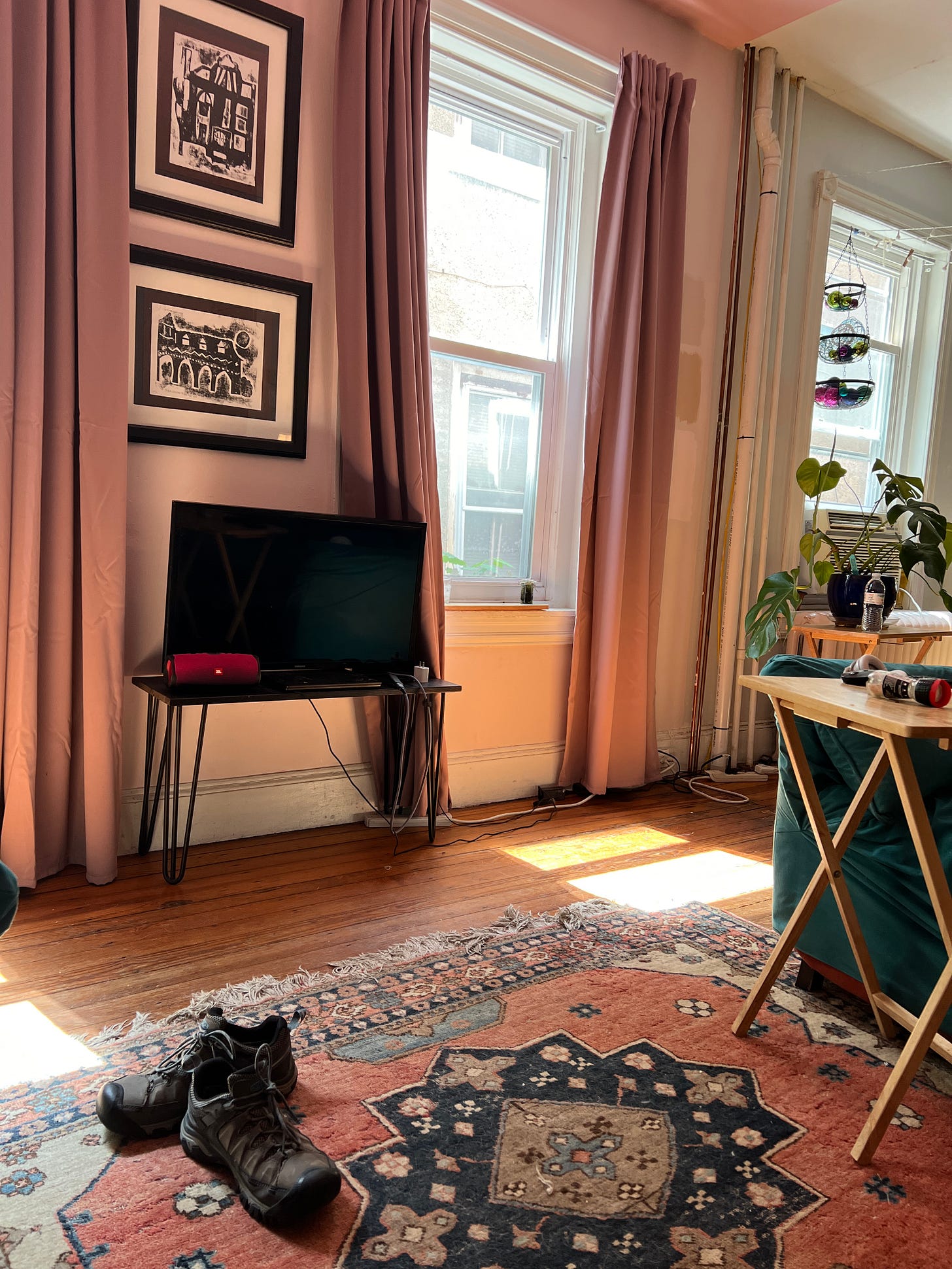
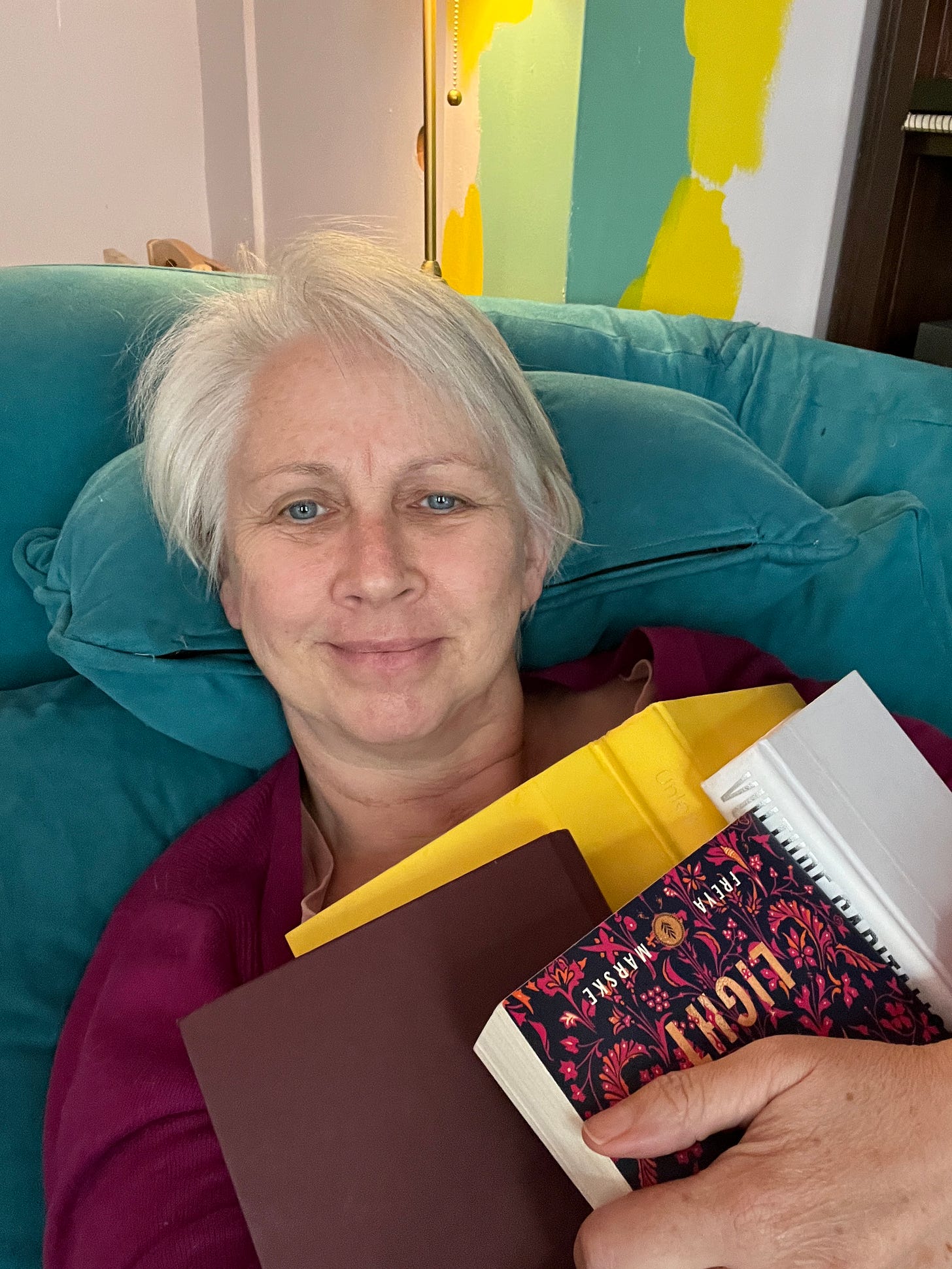
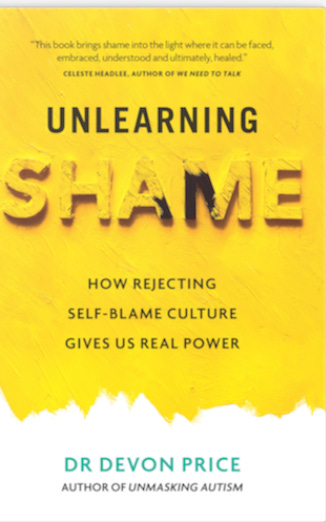
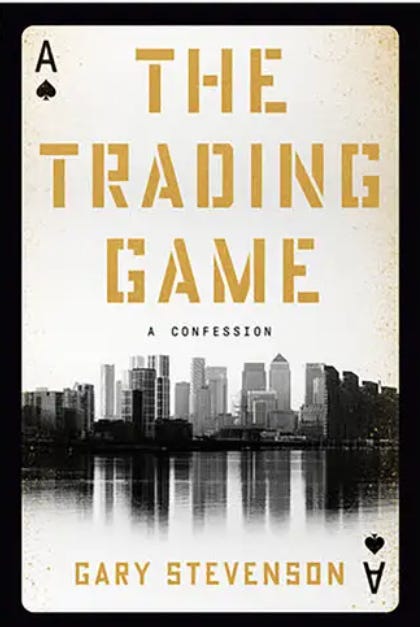

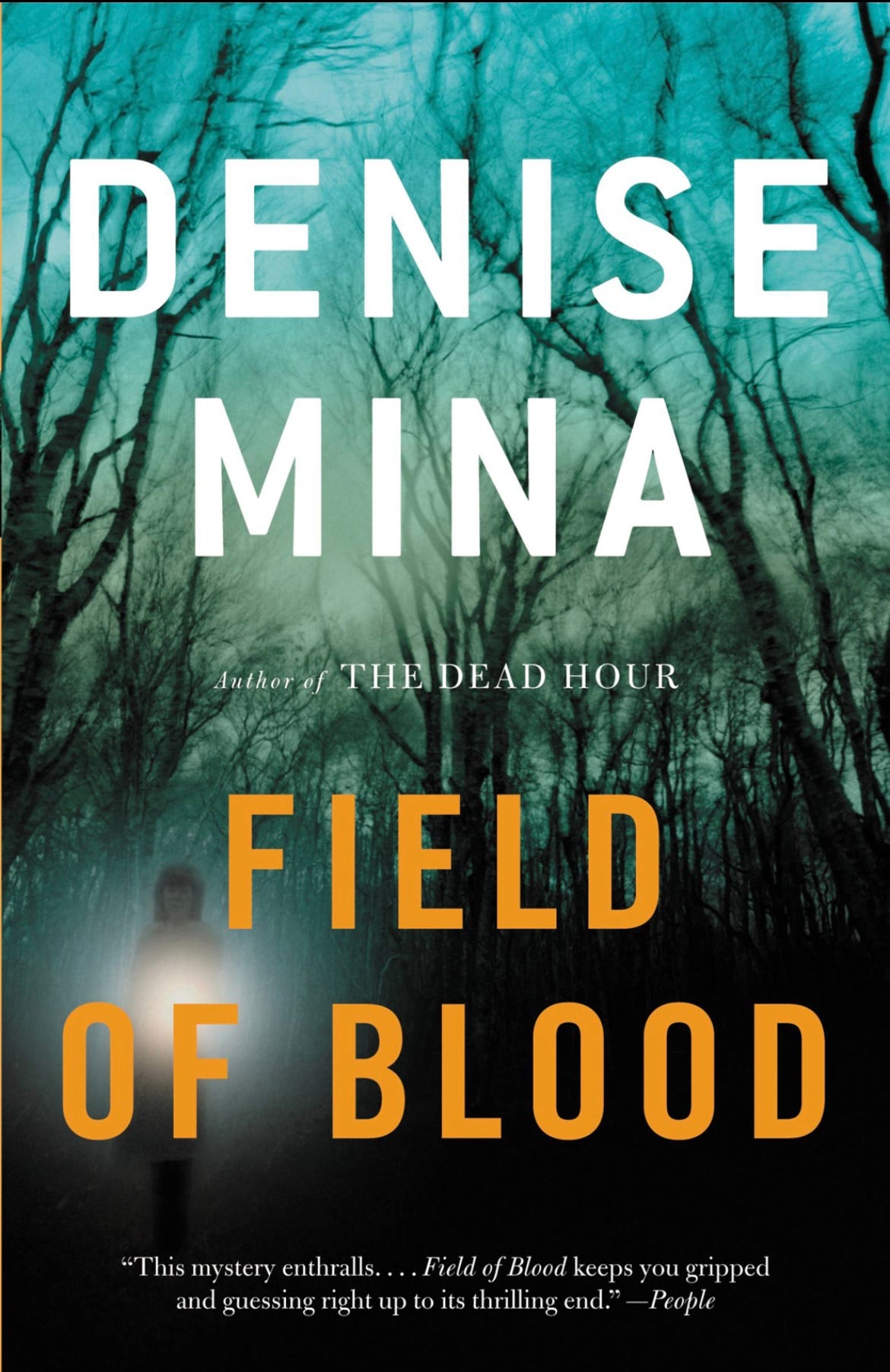

Not sure the goal of yellow?
And not clear on your wall color. I am into yellow right now - it's an amazing energy.
I do suggest getting or making some large scale art in that color scheme and place it on different walls to see what it feels like. Personally I hate gloss in almost any situation 😱, but that's a different issue. I can see a bright yellow and white combo for a sun porch, or attic bedroom, some thing like that, or fun hype colors/summer/Caribbean with saturated blues/greens/pink etc.